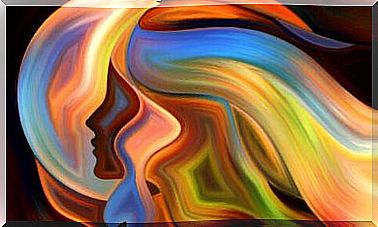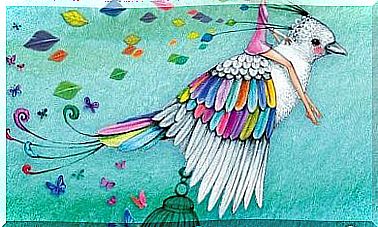Differences Between Introverted And Hypersensitive People

The differences between introverted and hypersensitive people are often significant. As Elaine Aron’s study notes, there are also highly sensitive extroverts.
So while the two aspects have a number of traits in common, they also exhibit certain subtleties, nuances, and peculiarities that make them unique. So that gives them, on a closer look, a particular aspect.
Carl Jung defined the terms introversion and extraversion for a long time in his book Les Types Psychologiques. However, it is common that mistakes are still made when using them in relation to personality.
It is good to note that these 2 concepts are not exclusive. That is, no one is completely extroverted or completely introverted in all aspects of their life.
Note also that we often let ourselves be influenced by words, labels and definitions which sometimes lack precision. For example, experts like John Cheek of the University of Texas conducted a study in 2011 in the field of the study of personality. They concluded that we can identify 4 different typologies within the introversion spectrum.
The personality of the human being and its understanding is a field as complex as it is fascinating. The science of psychology has been trying since the 1930s to lay the foundations.
Since the publication in 1936 of Gordon Allport’s Personality , we have made significant progress in this direction. It is therefore fundamental to understand, in psychology, certain nuances such as those which distinguish introversion from hypersensitivity.

The differences between introverted and hypersensitive people
It is common to associate introversion and hypersensitivity almost exclusively. Likewise, it is common to think that all introverts are very shy and that extroverts need social stimulation all the time. He is nothing in reality.
There are, for example, sensitive extroverts. Indeed, they are often people whom one meets in the activist spheres among lawyers or among social workers… They are professionals who, very often, dedicate themselves to the others and who know the empathy.
In other words, they feel the need to be in touch with people, but are often unable to protect themselves from the emotional pain of others. Understanding the differences between introverts and hypersensitive people can help us recognize these patterns and better understand ourselves.
Introverts
Books, such as The Power of Introverts by Susan Cain, allow us to delve deeper into this type of personality. Thus, the conclusions of his richly documented work are quite similar to the theories established by Hans Jürgen Eysenck in his time. Indeed, this pioneer of psychology also underlined in his study of the personality that the introversion has a genetic origin.
In other words, there would be a biological factor. For example, it has been shown that an introvert’s brain does not receive a lot of dopamine when it interacts socially. For him, there is a kind of threshold, a limit where a conversation ends up tiring him. There is also a limit where a party stops being fun to become suffocating and makes him want to be alone.
However, we also need to know that not all introverts necessarily empathize with everyone around them. There are some introverts who don’t connect emotionally with others at all and find no interest in doing so.
In addition, as specified previously, we can differentiate up to 4 types of introverts. This is also another difference with hypersensitive people.
These 4 types are:
- First, anxious introversion: it is associated with problems of stress and anxiety
- Social introversion: this consists of avoiding certain social contexts due to personal insecurity
- Imaginative introversion: it characterizes very introspective and dreamy people
- Finally, reserved introversion: these are distant, cold and analytical profiles
Hypersensitive people
One aspect that we have already pointed out about hypersensitivity is that it also appears in extroverted people. Therefore, we are not faced here with an “exclusive” characteristic of introversion. Rather, it is a characteristic present in about 20% of the population.
In contrast, hypersensitive people share the following traits:
- The hypersensitive person treats their reality in another way. Thus, each stimulus is perceived with greater intensity
- Whether it is about lights, sounds, the friction of certain types of clothing on the skin, the temperature… All these stimuli are felt with more force. Sometimes it can even be painful
- This hypersensitivity is present in the same proportion in men and in women.
Studies comparable to those conducted by Dr. Bianca P. Acevedo, of the Department of Psychological and Brain Sciences at the University of California, highlight the following facts:
- Hypersensitive people have greater brain activation in regions involved in processes related to attention, awareness, empathy and finally sensory information
- They suffer more in the event of deceptions or lies for example
- They connect intensely with the emotional realities of others

Other important aspects of introverted and hypersensitive people
We now know that there are many differences between introverts and hypersensitive people. So there are nuances that can undoubtedly help extroverted profiles, including some hyperactive children, to understand why other people’s emotions impact them so much or why they have trouble managing theirs.
It is certain that the peculiarities of hypersensitivity can sometimes make life more complicated and difficult. On the other hand, there are other aspects to consider.
- Introversion is part of a spectrum where extremes can lead to serious limitations. By this we mean the anxious introverts who struggle daily with their fears, their insecurities and this singular difficulty in interacting socially.
- The other aspect concerns hypersensitivity: often this type of personality can be attracted to narcissistic profiles. While one seeks to serve the other, the latter takes advantage of the empathy of the hypersensitive to dominate him. The narcissist strengthens his ego and his need for control.
As we see, some aspects are present in both profiles. But also in other people who are neither hypersensitive nor introverted. So let’s work to maintain the balance, to know our potential and the possible pitfalls or weaknesses of our personality to ensure our well-being and our happiness.









